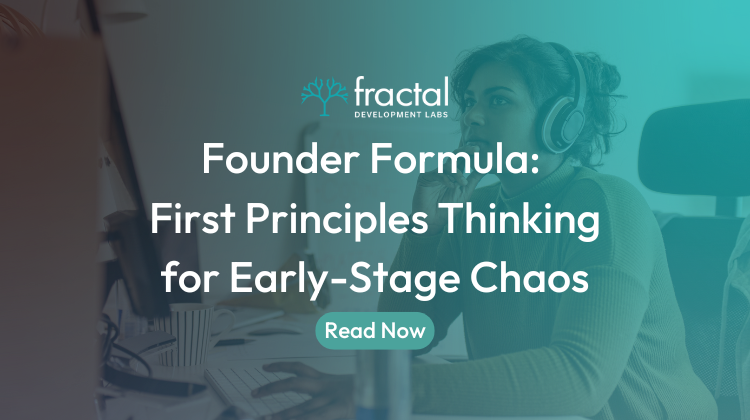
If you’ve ever been in the messy, exciting, chaotic early days of building a startup, you know how overwhelming it can feel.
Too many decisions.
Not enough time.
A million opinions pulling you in different directions.
In those moments, founders often fall into the trap of copying what others are doing, patching together “best practices,” or chasing shiny objects instead of building with clarity.
The problem? What works for someone else’s company may not work for yours.
That’s where first principles thinking comes in, and why it’s one of the most powerful tools an early-stage founder can use to cut through the noise, make smarter decisions, and actually build something that lasts.
First principles thinking is a problem-solving approach made famous by Aristotle, adopted by physicists like Richard Feynman, and popularized in the startup world by Elon Musk.
At its core, it means breaking problems down to their most basic truths, then reasoning up from there, instead of relying on assumptions, analogies, or industry norms.
Think of it like building a house: instead of asking, “How have other people built houses?” you ask, “What are the fundamental materials and principles I need to shelter people effectively?”
For founders, this mindset is a game-changer.
Early-stage founders live in chaos. You don’t have all the answers. You don’t have unlimited resources. You might not even have clarity on what the “right” product looks like yet.
That’s why copying what competitors are doing can lead you astray. Their context is different. Their customers are different. Their resources are different.
First principles thinking forces you to zoom out and ask:
When you strip away the noise, you end up with clarity. And clarity is what drives traction.
So how does this actually look in practice? Let’s break it down:
Most founders get caught up in their “big idea.” But a product that doesn’t solve a real problem won’t survive.
First principles thinking says: break the problem down to its rawest form. What pain point are users struggling with, and why does it exist?
You might assume you need a complex app with ten features to compete. But is that really true?
Ask yourself: what’s the smallest set of features needed to test whether people want this at all?
Early-stage chaos often looks like feature creep, bloated roadmaps, and trying to serve everyone.
Instead, focus on one thing your product can do better than anyone else.
Instead of throwing every idea into version one, start with an MVP (minimum viable product). Use it to test your assumptions, gather feedback, and iterate.
Each phase builds on validated learnings, not guesses.
Both companies ignored industry norms and stripped their ideas down to first principles. Then, they built upward.
When you’re bootstrapping, resources are scarce. You don’t have the luxury of overbuilding, overspending, or chasing every shiny idea.
First principles thinking protects you from:
❌ Burning money on unnecessary features
❌ Copying competitors who don’t share your context
❌ Making decisions based on assumptions instead of truth
Instead, it helps you:
✅ Save money by building lean
✅ Launch faster with clarity
✅ Make decisions confidently, even in chaos
At Fractal Labs, we know early-stage chaos firsthand; it’s where we live every day with our clients.
That’s why our process is rooted in first principles thinking. We don’t just take your idea at face value. We ask the tough questions:
By breaking things down, we help founders launch smarter, faster, and with confidence — no wasted time, no wasted money, no endless chaos.
Startup life will always feel messy. But when you ground your decisions in first principles, you create clarity where others see chaos.
The founders who win aren’t the ones who try to copy their competitors or chase trends. They’re the ones who strip things down, solve one problem brilliantly, and then scale from there.
That’s the Founder Formula.
If you’re an early-stage founder ready to bring clarity to your chaos, Fractal Labs can help you apply first principles thinking to your product and launch with confidence.